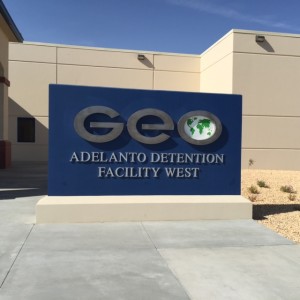This blog post was originally posted on the AILA Leadership Blog.
 On June 19, 2015, ICE/ERO announced a new policy that could significantly change the way transgender women are treated in immigration custody. On the positive side, the policy acknowledges the possibility that transgender women can be housed in women’s facilities, and it promises to provide training on the work that must be done to respect an individual’s gender identity. AILA and other non-profit organizations greeted this new policy with cautious optimism, but expressed concern that it would result in members of this vulnerable community being isolated from counsel and community. For example, the National Immigrant Justice Center (NIJC) commented that the policy was likely to “result in hubbing transgender women in remote areas where they cannot have meaningful access to counsel.” In the two months since ICE announced this policy, the concern over hubbing—and in particular in Adelanto, California—has only increased.
On June 19, 2015, ICE/ERO announced a new policy that could significantly change the way transgender women are treated in immigration custody. On the positive side, the policy acknowledges the possibility that transgender women can be housed in women’s facilities, and it promises to provide training on the work that must be done to respect an individual’s gender identity. AILA and other non-profit organizations greeted this new policy with cautious optimism, but expressed concern that it would result in members of this vulnerable community being isolated from counsel and community. For example, the National Immigrant Justice Center (NIJC) commented that the policy was likely to “result in hubbing transgender women in remote areas where they cannot have meaningful access to counsel.” In the two months since ICE announced this policy, the concern over hubbing—and in particular in Adelanto, California—has only increased.
This week, AILA and approximately 100 other non-profit organizations, led by Immigration Equality, sent a letter to President Obama calling on him to halt the transfer of transgender women to Adelanto. As this letter reflects, the move to house transgender women in Adelanto is deeply troubling, and is something that we as member of the AILA community cannot condone. This move is problematic because:
- GEO Group (which operates the facility) has a track record of ignoring abuse of members of the LGBT Community. The letter to President Obama singles out two facilities run by GEO—LaSalle (in Louisiana) and Joe Corley (in Texas)—as having a bad track record for the treatment of LGBT detainees. Mistreatment in GEO facilities seems to be the rule rather than the exception. For example, Clarisol (a pseudonym) from Honduras was detained at Broward Transitional Center—another GEO facility, in Florida—for more about a year where she endured regular harassment, name calling, and threats related to her gender identity. The GEO staff disregarded her complaints.
- Adelanto’s remote location isolates detainees from family, community, and counsel. Adelanto is a four-hour round trip drive from Los Angeles, on a good day. Once there, attorneys are subjected to long waits (often hours at a time) to see clients. And although the facility recently added 640 beds, it neglected to increase at all the attorney visitation space. Thus far, Adelanto does not have a system in place to allow attorneys to set up private calls with clients.
- Adelanto has a poor track record of providing appropriate health care. Even before the plan to move transgender folks to Adelanto was put into motion, ICE had received multiple complaints about health care at Adelanto. In May 2015, the ACLU of Southern California, along with numerous partner organizations, sent a letter to ICE to voice “deep concerns about the quality of health care provided” at Adelanto. To date, there has been no adequate response to the concerns identified in that letter, and detainees continue to complain about poor care.
- ICE is using the expansion of Adelanto as a justification to ship transgender women from all over the country to Southern California. Even though ICE’s 2012 transfer memo, disfavors transferring detainees away from their attorney or family, this practice is happening. NIJC has two clients who were transferred to Santa Ana (a nearby facility) without advanced knowledge or consent and expects transfers to be directed to Adelanto once the facility’s transgender pod is operational. Other AILA members have had this experience, and so have pro bono attorneys from large private law firms. In the absence of appointed counsel for immigrants, implementing a system that makes it virtually impossible for any counsel to represent transgender individuals—who are mostly asylum seekers—is a violation of these individuals’ right to counsel.
As immigration lawyers, we oppose the transfer of detainees to facilities that increase the risk of abuse, foreclose access to community and counsel, and perpetuate the warehousing of vulnerable populations.
Michael R. Jarecki is the AILA Chicago Chapter Second Vice Chair, member of the AILA Media Advocacy Committee, and an NIJC Leadership Board Member.
Keren Zwick is the managing attorney of NIJC's LGBT Immigrant Rights Initiative.

